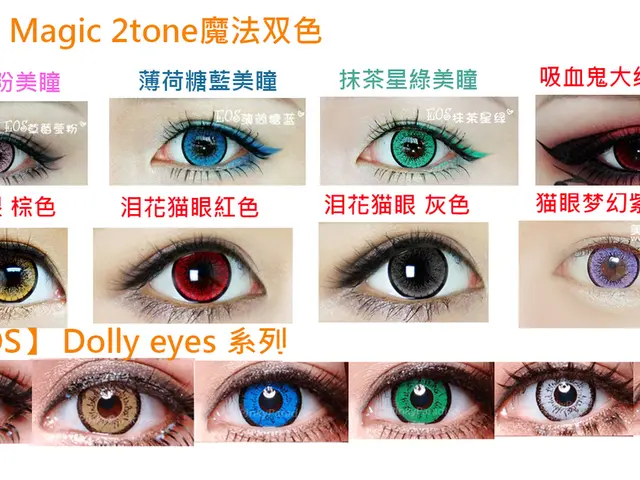Advantages of Donning Sunglasses Throughout Summer and Beyond
When the sun beats down during those scorching summer days, it's all about safeguarding our skin, right? But what about our eyes? Yes, those bad boys need some loving too!
Why? Well, let's dive into the nitty-gritty. The darn sun amplifies the risks for skin cancer, and here's an interesting fact: it's responsible for about 90 percent of skin aging by attacking the proteins keeping your skin firm and smooth like a baby's behind.
Now, you might be thinking that your peepers can fend for themselves as they're used to the radiant sun, but that's far from the truth, my friend.
Solar Retinopathy: The Eye-searing Sunburn
Ever looked directly at the sun, unwittingly gazed upon a solar eclipse, or basked in the intense rays for too long? Well, that harmful UV radiation zapped your retina, resulting in solar retinopathy. And guess what? That permanently seared retina can lead to vision loss and even blindness!
Pterygium (Aka "Surfer's Eye")
Picture this: a cloudy, wedge-shaped growth popping up on your cornea, starting from the corner towards your pupil. Sounds delightful, doesn't it? That's none other than pterygium, also known as "surfer's eye". This bugger usually remains small, but if it decides to take over, it can affect your vision and give you heaps of discomfort.
Photokeratitis: The Corneal Sunburn
In photokeratitis, UV light burns through the cornea like a barbeque skewer through a hot dog. The consequences? Eye sensitivity, pain, redness, watery eyes, blurry vision, and swelling. This can also rear its ugly head when UV light reflects off snow, ice, or water, or emits from a source like a tanning bed.
Cataracts: The Graying of the Eyes
When cataracts show up, your eye's lens turns cloudy. At first, they might not mess with your vision, but as they grow, they can make it hard for you to read, drive, or do mundane tasks. Cataracts usually pop up with age, but UV exposure speeds up the process.
Age-related Macular Degeneration (AMD)
Now, here's the real kicker—age-related macular degeneration (AMD). AMD causes the macula, the part of the eye responsible for your central vision, to decay with time. Over time, your central vision disappears, leaving you with a blurry mess in the middle of your field of vision. Overexposure to UV light raises the risk of developing AMD.
Migraines and Headaches
Still not convinced that sun protection is a must? Let's chat about headaches and migraines. Around 60 percent of headaches and up to two-thirds of migraines are caused by the blinding sun. It takes as little as five to ten minutes out in the sun to trigger a migraine. Yikes!
Saying Goodbye to Squinting and Glare
Sunglasses don't just shield your eyes from the harsh rays; they also have other bennies. Polarized lenses minimize glare from water, snow, or glass, making it easier for our eyes to focus and reducing eye strain and fatigue.
Tinted lenses keep us from squinting in bright sunlight, making it simpler to distinguish between objects and colors. Even on somewhat overcast days, it's smart to don those shades if you're gonna be outdoors for an extended period—to you and me, that means "all day."
Don't forget: Sunglasses with 95 to 100 percent UV protection or a "UV 400" sticker offer the best safeguard. Brown, green, and gray lenses are the best options, while yellow lenses provide less protection. If you already own a pair of sunglasses but are unsure about the UV protection, check with a photometer. Most likely, this device is available at your eye doctor's office and some sunglasses retailers.
To sum it up, cover up those pretty peepers with some shades and enjoy the wonders of the outdoors while keeping your eyes happy and healthy!
Sources:
- How Sunglasses Help Protect Your Eyes' Health - Johns Hopkins Medicine
- 5 Reasons You Should Wear Sunglasses More Often - River Heights Eye Care
- Sunglasses and Your Eyes - Columbia University Irving Medical Center
- What Role Do Sunglasses Play in Preventing Eye Strain and Fatigue? - Optical Masters
- Why Does the Sun Give Me a Headache? - TheraSpecs
Subscribers Manually Clipped Additional Sources:
- Why Does the Sun Give Me a Headache? - TheraSpecs
- How Sunglasses Can Help Prevent Migraines Triggered by the Sun-And More! - Optometrists' Clinic Inc.
- 12 Essential Benefits of Good Quality Sunglasses - All About Vision
- 5-Step Guide on Choosing the Right Prescription Sunglasses - ACUVUE
- Why Good Sunglasses Matter - Essilor
- Top 10 Sunglasses Brands - LensCrafters
- UV Protection: What Are Your Options? - American Academy of Ophthalmology.
- The harmful effects of UV radiation from the sun are not limited to the skin; it can lead to vision loss and even blindness through conditions like solar retinopathy, cataracts, age-related macular degeneration, and photokeratitis, which are all health-and-wellness concerns related to eye health.
- Wearing appropriate sunglasses with 95 to 100 percent UV protection can help shield the eyes from the sun's damaging effects, reducing the risks of age-related macular degeneration and other eye conditions associated with UV radiation, thus promoting overall health-and-wellness and wellness.




